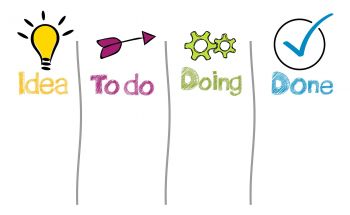Difference between revisions of "Kanban"
| Line 39: | Line 39: | ||
[[Category:Team Size 2-10]] | [[Category:Team Size 2-10]] | ||
[[Category:Team Size 11-30]] | [[Category:Team Size 11-30]] | ||
| + | |||
| + | The [[Table_of_Contributors| author]] of this entry is Matteo Ramin. | ||
Revision as of 10:22, 4 November 2020
| Type | Team Size | ||||||
|---|---|---|---|---|---|---|---|
| Collaborative Tools | Software | Personal Skills | Productivity Tools | 1 | 2-10 | 11-30 | 30+ |
What, Why & When
When you're thinking about how to manage your tasks, you might consider a Kanban board. A Kanban board is a tool that provides you with an overview of all tasks you (and your team) are currently working on and highlights the progress of each task. It especially helps when you feel you're loosing track of how things are progressing and/or losing oversight.
Goals
- Visualize work and keep track of tasks.
- Manage tasks efficiently for yourself or in a team
- Limit amount of work simultaneously done, thereby reducing complexity, increasing efficiency

Getting Started
In it's simplest form, a Kanban board is just a simple table with three columns (To Do, Doing, Done). You can easily draw it on e.g. a whiteboard and start adding post-it's. If you want to do it digitally, a tool such as Trello (see link below) might be your way to go.
If you want to get more sophisticated, you may add columns such as "On Hold" or "For Review" if need be.
Do be careful when your projects are getting bigger. Managing a Kanban board also means constantly keeping it tidy if you want to keep a good overview.
Links & Further Reading
Software you may want to consider:
The author of this entry is Matteo Ramin.